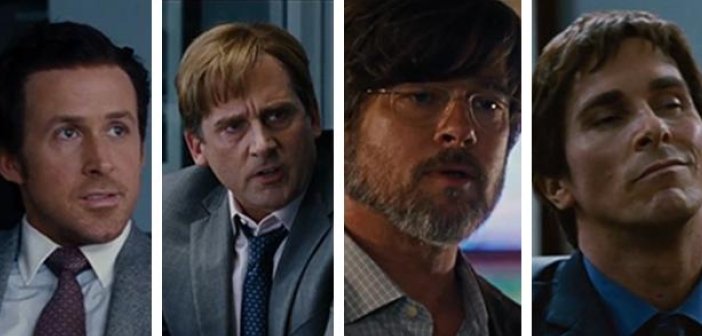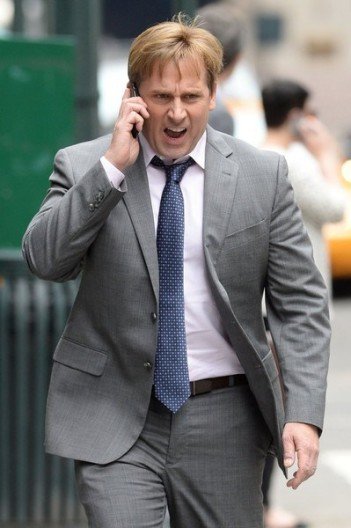Film Review | The Big Short is the Most Important Film of the Year
Directed by Adam McKay
Starring Christian Bale, Ryan Gosling, Steve Carrell and Brad Pitt.
In 2005 Dr. Michael Burry, a heavy metal enthusiast and the gifted hedge fund manager of Scion Capital, spots a problem with the US housing market – it is a bubble on the verge of bursting. Propped up on billions of dollars worth of mortgage bonds, he discovers the bonds are filled with sub-prime (or extremely risky) mortgages which, when the low or “teaser” rates used to entice people to buy them reset in 2007, would begin loosing value. This would in turn burst the mortgage bubble and the housing market would collapse. With no one listening to him he took a drastic decision – he invested the $1.3 billion in liquidity Scion Capital had in shorting the market i.e. in betting against the housing market (which at this time was at an all time high). In doing so he piqued the interest of only a handful of people; other hedge fund managers who saw that Burry was on to something. This is their story. This is our story.

At the end of the Vietnam War there was a period where filmmakers weren’t sure how appropriate it would be to make films about the war itself, how soon was too soon? Would the public, who turned with such vitriol on the soldiers who returned from the war, be able to accept or, daresay, enjoy a film about Vietnam? In 1978 Hal Ashby and Michael Cimino released Coming Home and The Deer Hunter respectively, three years after hostilities ended and it was an almighty gamble. Both films presented fractured, broken men, both physically and mentally, and both are absolute masterpieces. Dominating the 51st Academy Awards in 1979, together both films won three out of the four acting categories; Best Actor – Jon Voight, Coming Home. Best Actress – Jane Fonda, Coming Home. Best Supporting Actor – Christopher Walken, as well as Best Picture (The Deer Hunter), Best Director (Michael Cimino – The Deer Hunter and Best Screenplay (Robert C. Jones, Waldo Salt and Nancy Dowd – Coming Home). There was no doubt that society and cinema-going audiences were ready, but both of these films cleverly did not try sell them a gung-ho action film, instead they told them the truth. The Big Short is in very much the same position, to tell a story about something still so real and raw for millions of people, does Adam McKay’s film (remember, McKay is famous for his Will Ferrell collaborations, Anchorman, Talladega Nights, Step Brothers and The Other Guys) come just a little too soon? Absolutely not. The Big Short is already a contender for film of the year; it is a triumph from start to finish, handling its subject matter in much the same way filmmakers tentatively and respectfully approached those first few Vietnam films – it tells the truth, and believe me, it is a hard truth to take in places.
As mentioned above, Adam McKay is not known as a dramatic filmmaker, this is his first foray into this territory, albeit a film tinged with dark comedy, but he handles the subject matter carefully and with due attention to the reality that affected millions of Americans. There are several standout moments and performances on display, Brad Pitt’s admonishing of two young hedge fund managers for their ill thought out exuberant celebrations as they realise they are going to make tens of millions of dollars from the housing collapse, is absolutely perfect. Or Steve Carrell’s reaction to a conversation he has with a snake-slick investment banker over dinner, as he realises the gravity of the unfolding situation, is masterful. Or Rafe Spall’s interactions, as he conducts a door-to-door mortgage survey, with a tenant of a virtual ghost estate is filled to the brim with sympathy and sorrow as he knows what is coming down the tracks for these people in just a few short months. Yes, while McKay has crafted an empathetic film, he has also surrounded himself with an ensemble cast equal to anything Glengarry Glen Ross achieved. So real are the transformations that you would have to wonder how Christian Bale ever played Batman. Bale’s turn as Michael Burry is nothing short of revelatory and he could very well be winning his second Oscar soon. Ryan Gosling, with a dodgy barnet, ridiculously tanned skin and brown contact lenses, looks completely at odds with his heartthrob status but he injects proceedings with energy and a zip found in no other character. He is the film’s narrator and one of the main players and often breaks the fourth wall, talking directly to the audience to try and explain the technical jargon. Though distracting at first, these little digressions (with the help of cameos from Margo Robbie, Anthony Bourdain, Selena Gomez and Dr. Richard Thaler) give the viewer a little more insight into the machinations of the banking system, such as what a sub-prime mortgage is or what a CDO is – the rotten pillars that held up the US housing economy.

There are many little nuanced moments in this film that McKay needs to take plaudits for, the overall character of Mark Baum being one. Baum, Steve Carell’s character, is the heart of the film. Neurotic and dealing with his own personal loss (there are two scenes, one at the start and one at the end featuring Carell that are virtually identical in tone and emotional resonance but not content – they are beautifully acted and prove that his turn as John Du Pont in Foxcatcher was no fluke), Baum finds himself drawn deeper and deeper into understanding the complete breakdown of integrity within the banking system. He is a mirror for the audience, he learns as we learn about how deep the rabbit hole actually goes and that the banks were not oblivious to the impending catastrophe, that they were consciously selling “dog shit wrapped in cat shit” as Triple A mortgage bonds. Gosling’s character, Jared Vennett, succinctly shows the mortgage collapse in one amazingly constructed sequence (not giving away any spoilers) but it is Carell’s reaction to this explanation that really captures the weight of the moment. Also, as Baum meets with the Standard and Poor’s rating agency (another masterful turn from the ever impressive Melissa Leo) it is Carell’s questioning that teases out the true scale of disaster looming from the crumbling mortgage sector and his/our realisation that banks were mixing stupidity with fraud and serving it as The American Dream.
In many places, our introduction to Michael Burry in particular, The Big Short reads like a documentary, a lid-lifting expose of the corrupt banking system. Ordinary people are met along the way, the low paid workers who were encouraged to buy more and buy big, or the hard working joe paying his rent to a landlord who is already in default. It is these stories and countless others like them that sit at the back of your mind as you watch The Big Short; this isn’t fiction, this is real life. Even the central characters are based very much on real people; only Michael Burry keeps his own name for the film, but the events (as we all know) actually happened. Homes were lost. Jobs were lost. Pensions were lost. And, for many, hope was lost. These are hard things to balance, as we know the end result and our four main characters are hedge fund managers who made, in total, billions from the economic collapse. Yet it is a credit to McKay that none of them come out as the bad guy. Each character redeems themselves over the course of the film by trying to do the right thing at various stages and often it is this conflict, especially for Carell’s character, that proves the most interesting aspect.
Would I recommend The Big Short? I’ll put it to you like this – I naturally fidget; it’s what I do. I tap out rhythms with my fingers, I hum and I often move about in my seat when watching a film, be that at home or in the cinema. It has nothing to do with what I’m watching or my level of interest in it; it’s just me. I also enjoy, when in the cinema especially, peanut M&M’s. I have, in recent years, found a way of measuring my enjoyment of and my engagement level with a film by the amount of movement I make counterbalanced by the amount of peanut M&M’s left rolling around in the bottom of the bag when the credits role. When The Big Short was over and the lights came up I noticed two things. I hadn’t so much as moved a muscle in my seat, and my pouch of M&M’s was left unopened. Based on the above, I will let you come to your own conclusions on how I received The Big Short.
The Big Short is in cinemas now. Check out the trailer below.
[youtube id=”vgqG3ITMv1Q” align=”center” autoplay=”no” maxwidth=”750"]
Featured image credit Source

